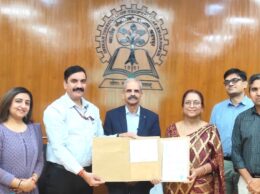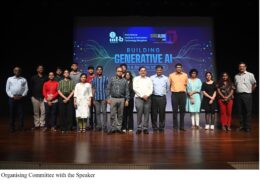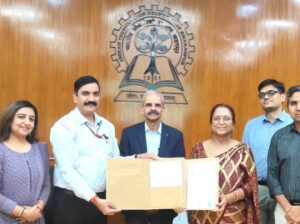CHENNAI : Indian Institute of Technology Madras Researchers collaborated with International Researchers to find possible solutions to the productivity and pollution problems of manufacturing firms in India. They studied the manufacturing sector of the Indian economy using data from the ‘Prowess IQ’ database of the Centre for Monitoring the Indian Economy from 2001 to 2015.
Based on the econometric analysis, this research suggests a green domestic policy mapped with FDI and trade to increase productivity and energy efficiency for the manufacturing sector in India.
Other Key Findings include:
Ø One-to-one correspondence and linkages between tax and energy intensity will promote renewable energy.
Ø Firms that are improving energy efficiency can be either given tax credit or tax exemption as rewards.
Ø There is an urgent need to replace vintage capital and adopt new technology.
The study also has important policy implications with regard to global climate change regulations as an increasing number of cap-and-trade emission trading systems are also being implemented around the globe (Ex: in California in the U.S. and China).
As pollution-intensive industries and firms are more likely to be attracted by lax environmental policy, ‘Performance, Achievement and Trade’ policies need to focus on these firms. Additionally, as firms in pollution-intensive industries seem to prefer to relocate to pollution havens rather than innovate, assisting these firms in improving their energy efficiency and reducing their pollution can help them gain legitimacy and maintain their business.
The researchers further conclude that the positive spillovers from export participation and foreign direct investments could help the Indian economy and increase energy efficiency in the manufacturing sector. A sustainable energy policy targeting the manufacturing industry is essential for the Indian economy to contribute to green and sustainable development.
This research was led by Dr. Santosh Kumar Sahu, Assistant Professor of Economics, Department of Humanities and Social Sciences, IIT Madras, and included Mr. Prantik Bagchi, Research Scholar, Department of Humanities and Social Sciences, IIT Madras, Chennai. The International research partners include Prof. Ajay Kumar from EMLYON Business School, Ecully, France, and Prof. Kim Hua Tan from Nottingham University Business School, U.K.
The findings of this study were published in the reputed, peer-reviewed journal Annals of Operations Research (https://doi.org/10.1007/s10479-021-04295-7)
Explaining the key findings of this research, Dr Santosh Kumar Sahu, Assistant Professor of Economics, Department of Humanities and Social Sciences, IIT Madras, said, “Economic profit maximization is one of the main objectives of any industry or firm. But with global climate change, does a firm look towards reducing carbon emissions and pollution at the cost of lower productivity? Is it right to levy more taxes on firms to reduce greenhouse emissions? Does one target economic development or become more eco-friendly? These are questions we set out to find answers to.”
Highlighting the key applications of this research, Dr Santosh Kumar Sahu said, “In this research, we focused on linking existing energy policies with productivity and energy intensity. This research can be used as the basis for redesigning future PAT schemes and energy policies for pollution-intensive firms to achieve energy efficiency. We are also now working on estimating carbon productivity for the firms in India’s manufacturing sector to link innovation, R&D, energy efficiency and carbon productivity. These results will be beneficial for better energy and climate policy for India. ”
The researchers feel that more recent data, including information on the stages of research and development, patents, and environmental expenses at the firm level for manufacturing industries, would be highly beneficial to explain India’s energy consumption and emission structure.
Two factors were considered in this study: energy intensity and energy efficiency. Energy intensity can be used as a proxy for energy efficiency. Their data analysis from 2001 to 2015 concluded a decreasing trend for energy intensity, implying energy efficiency has increased. An increase in energy efficiency for the firms in the manufacturing sector indicates technological advancement at the firm level.
Price instruments and technology are instrumental in increasing energy efficiency. There is ample evidence suggesting that technology plays a significant role in reducing energy intensity, which is in line with this study.









